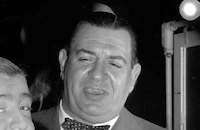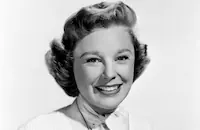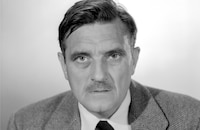Meet the People

Brief Synopsis
Cast & Crew
Charles Riesner
Lucille Ball
Dick Powell
Virginia O'brien
Bert Lahr
"rags" Ragland
Film Details
Technical Specs

Synopsis
As soon as he sees Broadway star Julie Hampton addressing a crowd of Morganville, Delaware shipyard workers during a war bond drive, welder William "Swanee" Swanson falls in love. To meet Julie, who has offered a date to the man who sells the most bonds, Swanee claims to have $7,500 in pledges. Then, to further his own case, Swanee surprises Julie by announcing that she will kiss every man who makes a pledge to him. After hordes of shipyard workers rush to the stage for a kiss from Julie, Swanee wins the contest. For their date, Swanee drives Julie in his rundown car to Inspiration Point. While romancing Julie, Swanee reveals that he is a playwright and has written a working man's musical, Meet the People , with his cousin John, a composer and fighting Marine. Swanee performs the musical's love song for Julie, who is impressed enough to show the play to her producer, Monte Rowland. Monte agrees to stage the musical on condition that costumes and sets from his previous show be used. When Swanee travels to New York to see a dress rehearsal, he is dismayed to discover that Monte and Julie have turned his "everyman" show into a glitzy extravaganza. Disgusted, Swanee declares that, as per his contract, the show must be restaged to his specifications or be canceled. Sure that he can pressure Swanee into changing his mind, Monte cancels the show himself and releases Swanee from his contract. Instead of capitulating, however, Swanee accuses Julie of gross self-promotion and returns to Morganville. Determined to reclaim Meet the People , Julie follows Swanee to Morganville and gets a job as a shipyard welder. To her surprise, Julie enjoys her new assignment and quickly makes friends with her starstruck co-workers. While picnicking with Swanee one Sunday, Julie confesses why she came to Morganville, but adds that she now wants to mount Swanee's show so that her needy chorus girl friends will have work. Impressed with Julie's apparent reformation, Swanee resigns with Monte. When he sees Julie posing for publicity photographs in her welding uniform, however, he once again denounces her as a self-serving egotist. Just then, Julie learns that all war jobs have been frozen and that she must remain indefinitely at the shipyard. After she broadcasts a pep talk to her fellow workers, a vengeful Julie tricks Swanee into revealing his true feelings for her while her microphone is still on. Laughed at by his peers, Swanee again accuses Julie of being a selfish hypocrite and storms away. Later, Swanee's uncle Felix confesses that he told John, who is soon returning to Morganville on a medical leave, that Meet the People was a Broadway hit. To help out his uncle, Swanee offers to produce the show as part of the shipyard's upcoming 300th ship celebration. Julie, however, has decided to stage her own star-studded show and refuses to consider doing Meet the People . When John, who has been told by Felix that Julie is doing the show, arrives in her shipyard office to thank her, she sadly tells him the truth. Later, however, she changes her mind and announces she is having an open casting call for Meet the People . Swanee, who for days has been searching for the owner of the shipyard in order to convince him to back Meet the People , returns to town, unaware that his musical is about to open. After a lonely Julie admits to herself that she loves Swanee despite their disagreements, she and Swanee happily reunite on stage for the show's patriotic finale.

Director

Charles Riesner
Cast

Lucille Ball

Dick Powell

Virginia O'brien

Bert Lahr

"rags" Ragland

June Allyson

Steve Geray
Paul Regan

Howard Freeman

Betty Jaynes

John Craven

Morris Ankrum
Miriam Lavelle
Ziggie Talent
Mata And Hari
Vaughn Monroe

Spike Jones
Bobbie Canvin
Thora Mathiason
Jean Forward
Tudor Williams
Gene Ramey
Harry Stanton
Virginia Rees
Clifford Holland
Henry Kruse

Kay Medford
Joey Ray
Dell Henderson
The King Sisters
Thelma Joel
Barbara Bedford
Mary Ganley
Katharine Booth
Mary Mcleod

Joe Yule
Patsy Moran

Roger Moore
Celia Travers
Robert E. O'connor
Fred "snowflake" Toones
Dick Elliott
John Bagni
Hugh Maguire
Donald Davis

Bobby Blake
Dickie Hall
Russell Gleason
Al Hill
Buddy Gorman
George Magrill
George Lloyd
James Warren
Fred Beckner
Myron Healey
Eddie Hall
Michael Owen
Gloria Grafton
Creighton Hale
Hooper Atchley
Frank Hagney
William Tannen
Dorothy Ford

Lee Phelps
Capt. Somers
Sam Ash
Al Ferguson
John Berkes
Kay Deslys
Lucille Casey
Natalie Draper
Alice Eyland
Noreen Roth
Linda Deane
Hazel Brooks
Eve Whitney
Erin O'kelly
Peggy Maley
Kay Williams
Florence Lundeen
Leon Belasco
Frederick Giermann
Larry Steers
Jack Deery
Wyndham Standing
Harry Adams
Earl Schenck
Pat West
Myrtle Ferguson
Patt Hyatt
Crew
Mac Alper
Harold Arlen
Earl Brent
Jack Donahue
Sammy Fain
Dave Friedman
Cedric Gibbons
Jay Gorney
E. Y. Harburg
E. Y. Harburg
Lorenz Hart
Lennie Hayton
Wally Heglin
S. M. Herzig
Hubert Hobson
Irene
Virginia Kellogg
Burton Lane
Sammy Lee
Henry Myers
Merrill Pye
George Rhein
Richard Rodgers
Fred Saidy
Conrad Salinger
Sharaff
Douglas Shearer
Gile Steele
Robert Surtees
Kay Thompson
Alexander Troffey
Charlie Walters
John Watson
Edwin B. Willis
Hugo Winterhalter

Photo Collections
Videos
Movie Clip



Trailer
Film Details
Technical Specs

Articles
Meet the People
The American people got to meet a whole new side to Dick Powell in 1944, one that meshed perfectly with the new filmmaking style known as film noir. Powell's other two 1944 offerings, Murder, My Sweet and Cornered, proved without a doubt that he had indeed transformed from a crooner into a tough guy who wasn't afraid to fight dirty. Audiences loved the new Dick Powell, but they still accepted him in musicals.
Director Charles Reisner started in the film business during the First World War as a screenwriter and comedy performer, working for movie studios such as Keystone, Vitagraph, and others. He was the associate director for Charlie Chaplin's A Dog's Life (1918), The Kid (1921), The Pilgrim (1923), and The Gold Rush (1925), playing nasty villains in the first three. He also appeared as an actor in a number of silent features in the 1920's. A director from the mid-1920s on, he specialized in comedy, working with Buster Keaton, W.C. Fields, Marie Dressler, the Marx Brothers, and Abbott & Costello. In 1928, Reisner co-directed Steamboat Bill, Jr. with Keaton.
The producer for Meet the People was E.Y. "Yip" Harburg, a former owner of an electrical appliance business before turning to writing songs and librettos for stage and film during Hollywood's talkie boom in 1929. Working in collaboration with such composers as Vernon Duke, Arthur Schwartz, Jerome Kern, and Harold Arlen, Harburg wrote lyrics to "I'm Yours," "Brother, Can You Spare a Dime?," "Thrill Me," "It's Only a Paper Moon," "Lydia, the Tattooed Lady," "Old Devil Moon," "If I Only Had a Brain," and "Ding Dong the Witch is Dead." He won an Academy Award for the lyrics to "Over the Rainbow" in 1939 for MGM's The Wizard of Oz.
Director: Charles Reisner
Producer: E.Y. Harburg
Screenplay: Ben Barzman, Sol Barzman (story), S.M. Herzig, Louis Lantz (story), Fred Saidy
Cinematography: Robert Surtees
Editor: Alex Troffey
Music: Lennie Hayton
Cast: Lucille Ball (Julie Hampton), Dick Powell (William "Swanee" Swanson), Virginia O'Brien ('Woodpecker' Peg), Bert Lahr (The Commander), Rags Ragland (Smitty), June Allyson (Annie).
BW-101m.
by Scott McGee

Meet the People
Quotes
Trivia
In a radio interview, Spike Jones stated that the ape that plays Hitler is the same ape that appears in the Tarzan movies.
Notes
Prior to its New York opening, Louis Lantz and Ben and Sol Barzman's play Meet the People was performed in Los Angeles. In the film, Paul Regan, who plays "Swanee's" friend "Buck," does several impersonations of celebrities, including Cary Grant, Ronald Colman and Henry Morgan. The "Shicklegruber" number features a comic impersonation of Benito Mussolini and a chimpanzee dressed like Adolf Hitler. (Schicklgruber was Hitler's father's real name.) In that number, an excerpt from the sextet from the opera Lucia di Lammermoor, music by Gaetano Donizetti, libretto by Salvatore Cammarano, is performed.
Hollywood Reporter news items add the following information about the production: In late October 1941, M-G-M hired Francis Wallace to adapt the stage show, then in November 1942, assigned Hugo Butler to work on the screenplay. The contributions of these writers to the completed film has not been confirmed. In addition to writing the play, Ben and Sol Bartzman and Louis Lantz worked on a treatment for the picture. Although Victor Borge, Lena Horne and Nancy Walker were announced as cast members, they did not appear in the completed film. Robert Strickland, Beryl McCutcheon, Billy Engle, Eugene King, Gertrude Bennett, Margaret Bert, Frank Adams, Julian Smith, Sydney Troy, Margaret Adden, Jean Murray, singers Elsa and Eileen Nilsson, Dewey Robinson and Judy Clark were also announced as cast members, but their appearance in the final film has not been confirmed. The following songs were written for the film, but were not used: "In Times Like These" by Sammy Fain and E. Y. Harburg; "Thank You, Columbus" by Burton Lane and Harburg; and "Song of the Bayou" by Rube Bloom. In March 1944, a 16mm version of Meet the People was shown to troops overseas before its U.S. release. June Allyson and Dick Powell, who married in 1945, performed together onscreen for the first time in this film.















